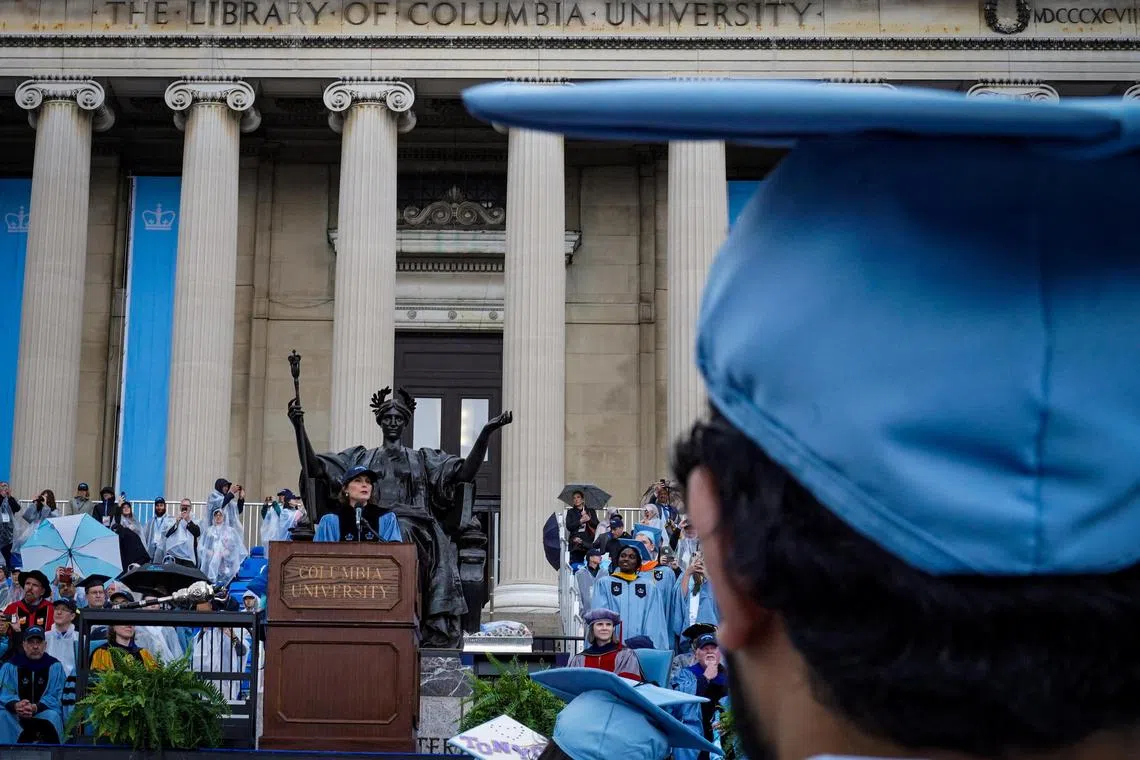Graduates boo Columbia’s president at commencement after a fraught year
Sign up now: Get ST's newsletters delivered to your inbox

The university's acting president Claire Shipman managed to finish her remarks, which focused on the importance of democracy, and went on to officiate the ceremony.
PHOTO: REUTERS
Sharon Otterman
Follow topic:
NEW YORK – Ms Claire Shipman, the acting president of Columbia University, was met with a chorus of boos on May 21 from some of the 12,000 graduates at the school’s main commencement ceremony as she took the podium to deliver remarks.
The graduates of Columbia’s class of 2025 had taken meaningful classes and made lifelong friends.
But they had also lived through campus lockdowns, the arrests of hundreds of students at pro-Palestinian protests and a revolving door of university presidents.
So it was with a mixture of gratitude and anger that the graduates gathered for a large ceremony in the rain.
The 2024 commencement was cancelled in the aftermath of pro-Palestinian encampments
Ms Shipman kept talking over the boos, praising the families, teachers and graduates. “Graduates, it is time to give the world your gifts,” she said.
Amid a clampdown by the Trump administration on international students involved in pro-Palestinian activism, Ms Shipman spoke in favour of the rights of those students, saying: “We firmly believe that our international students have the same rights to free speech as everyone else.”
She said they should not be punished for exercising those rights.
The president noted that many graduates were “mourning” that Mr Mahmoud Khalil, a new graduate who continues to be detained in Louisiana
Through the jeers, many other graduates remained quiet as the rain soaked them and chants of “Free Palestine” rang out through the student crowd.
Ms Shipman managed to finish her remarks, which focused on the importance of democracy, and went on to officiate the ceremony, conferring degrees on the sea of graduates clad in light-blue gowns.
The celebrations at smaller graduation ceremonies on May 21 were also punctuated by anger directed at Columbia administrators.
At the graduation for Columbia College, the university’s main undergraduate school, some students repeatedly interrupted Ms Shipman’s remarks with loud jeers.
At one point, they chanted “Free Mahmoud.”
Mr Khalil’s name was announced on May 21 as a graduate during the ceremony for the School of International and Public Affairs.
While students cheered his accomplishment, several graduates wearing kaffiyehs refused to shake the hand of their dean, Dr Keren Yarhi-Milo, an Israeli who served in her country’s military.
Jewish students who said they had been deeply hurt by anti-Semitism on campus during 19 months of protests against Israel also had profoundly mixed feelings about the day.
Some Jewish students reported to Columbia’s anti-Semitism task force that they had been ostracised by their peers for supporting Israel, or had been expected to denounce the country before being accepted in student groups.
“To be honest, I’m so happy to finally be leaving Columbia,” said Ms Eliana Goldin, who headed Aryeh, a pro-Israel student organisation. “They’ve given me so much, and I’m incredibly appreciative of the education I’ve received, but I’ve also reached my limit for how much anti-Semitism I can experience and how much backlash for standing up for Israel I can take.”
As graduates and their relatives filed out of the subway, they were met with the sound of drumbeats and protester chants.
Demonstrators outside the university’s main gate chanted, “From the river to the sea, Palestine will be free,” “Columbia will fall” and “One solution, revolution.”
By 11.30am, about 100 to 125 demonstrators had gathered. A group of former students burnt their diplomas. Small skirmishes with law enforcement officers broke out.
The police said they had arrested two people at the protest; one was charged with reckless endangerment, while the other faced three charges, including resisting arrest.
The ceremony inside the gates went on interrupted.
Ms Maryam Alwan, a graduating student who had been a leader of pro-Palestinian activism, explained the anger that she and her peers had expressed through booing.
“Over the past two years, I’ve been arrested, suspended, forcefully removed by Columbia Public Safety, put through a disciplinary trial for an anonymous political op-ed and left with no protection from death threats and harassment,” she said.
“But I am lucky to walk across the stage when every university in Gaza has been reduced to rubble” and Mr Khalil cannot, Ms Alwan said.
About 12,000 graduates and 25,000 guests attended May 21’s commencement at Columbia’s Morningside Heights campus in Manhattan, on the same lawns where demonstrators erected tents in 2924.
Graduates of Columbia’s 17 different schools held up symbols – including red inflatable hammers for engineering and inflatable owls for general studies – to represent their institutions as their degrees were conferred.
The Trump administration has pulled more than US$400 million (S$515.8 million) in federal grant funding
The school has agreed to demands to tighten its student disciplinary procedures and increase oversight of its Middle Eastern studies programmes, but the money has not yet been returned.
The president of Barnard, Ms Laura Rosenbury, was also booed by some of the graduates as she got up to speak.
Barnard, a Columbia affiliate school, had also suspended and expelled several students involved in pro-Palestinian activism. NYTIMES
Wesley Parnell contributed reporting.

